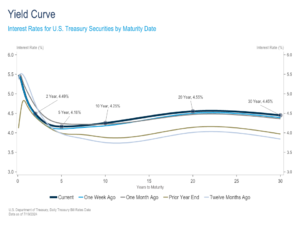Weekly Market Insights 07.22.24
The World Turned Upside Down
Financial Markets
It was an interesting week in the equity markets! We saw the start of a potential market rotation, and the week ended with a global tech outage stemming from a single software update from CrowdStrike. Often, after a volatile week in the market, investors and analysts begin to wonder whether a correction is underway. Reviewing last week’s performance numbers for the major equity market indices helps to make sense of the situation.
The Dow gained 0.72%, the S&P 500 lost 1.97%, while the tech-heavy NASDAQ lost 3.65%—less than stellar numbers to say the least. However, small caps diverged from the pack, with the Bloomberg 2000 rising 1.63%, significantly outperforming large-cap stocks during the week. This is quite the opposite of what investors have gotten accustomed to. It can mean all or none of what follows. At the extremes, it could mean a correction or the end of the bull market, but it could also mean a rotation is underway. It is way too early to tell, but, clearly, these are important points to ponder. As readers will see in the economics section, we don’t see either of the extreme outcomes as especially likely. A wild card is the very unusual and vitriolic election we are facing. President Biden’s withdrawal from the race is only the latest in what has been and will continue to be a turbulent election cycle.
Economics
The Fed’s steady as she goes policy appears to be working. We have argued for some time that the Fed is on the correct path, and the economic data has been supportive of that stance. This is why we argued earlier that a market collapse is the most unlikely market event.
One of the major election debates revolves around the future of globalization. The idea of globalization has been around for a very long time. Three of its earliest and most important advocates were David Hume, Adam Smith, and David Ricardo—all famous for their foundational economic writings during the 18th and early 19th century. However, global trade and comparative advantage were long in use hundreds of centuries before these early economists put pen to paper. History is replete with stories of sailing vessels crisscrossing the Mediterranean and Adriatic seas since the beginning of recorded time.
The theory of Comparative Advantage is quite simple. If each country produces what it makes at a lower cost and trades for what the other makes more efficiently, both countries are better off. However, there are three very important related points to consider. First, comparative advantage presumes a governing body is in place to enforce global laws and regulations. Second, countries are incentivized to make better products more inexpensively in hopes of changing the terms of trade. Lastly, there are certain products, such as rare earth elements, that are vital to a nation’s existence, which may be legitimately subsidized. The theory of Comparative Advantage says nothing about competition but assumes each country will act in its own best interest. Ultimately, it expects global competition to be fierce but for each country to achieve outcomes they wouldn’t have been able to on their own.
Conclusion
As we were writing the conclusion to this paper, President Joe Biden announced he is dropping out of the presidential race. It is certainly not the way he and many others would have liked to see it end. We thank President Biden for a long, distinguished career, and wish him well.

Read pdf here.